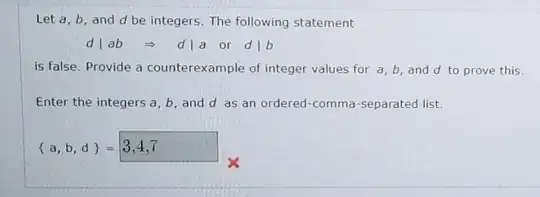Why is this wrong? Doesn't $a | b$ mean $a$ divides $b$ so $b = a(x)$?
So then if $a=3, b=4, d=7$ then
$d | ab$ will mean $12 = 7(12/7)$, $d | a$ will mean $3 = 7(3/7)$, $d | b$ will mean $4 = 7(4/7)$
so $d | ab$ is not equal to $d | a$ or $d | b$
doesn't that mean this is a counterexample?
I must be not understanding it correctly.
Can someone please explain?
